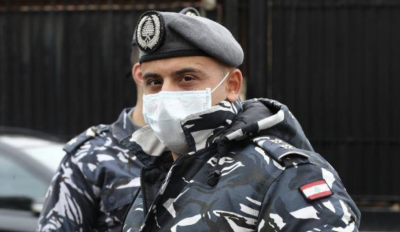
Lebanese Internal Security Forces officers in front of the courthouse in Beirut. (Credit: Hassan Ammar/AFP File Photo)
BEIRUT — "I lost everything I had in Lebanon — my life, my career, my salary and my freedom. It will never work out if I return," former Internal Security Forces (ISF) member Bilal Ghanem lamented. In the summer of 2021, after he was rejected for travel to Norway to check on his cancer-stricken brother and bring back critically needed medication to his father, Ghanem left Lebanon clandestinely.
"If I dare come back to Lebanon today, I would be immediately caught and sent to jail," the 38-year-old man said.
Since the onset of Lebanon’s severe economic crisis in 2019, which slashed the purchasing power of civil servants, "over 1000" ISF employees have deserted their roles, according to a senior source in the ISF. Others have been moonlighting as mechanics, waiters or Taxi drivers.
Member of Parliament Ibrahim Mneimneh said ISF deserters are being "treated as criminals and are considered to be violating the law for wanting to leave the service." He wants to change this by proposing a new draft law to lessen the penalties for deserting the service.
Risky business
Ghanem began his career with the ISF as an adjutant before being transferred to the Protective Security Department, responsible for protecting high-profile individuals and officials.
He risked his life as an escort for Lt. Col. Samir Chehade, who survived a 2006 car bomb assassination attempt in Rmeileh, south Lebanon. The bombing killed four of Chehade's escorts, including Ghanem's uncle.
"Every time I went to work, I wasn't sure I'd be back home," Ghanem told L'Orient Today.
In 2020, Ghanem's brother and mother were battling cancer. Ghanem's request to leave Lebanon to visit his brother in Norway and bring back medications for his mother was rejected. After 15 and a half years in the ISF, Ghanem deserted the service in the summer of 2021 after his father was also diagnosed with cancer. He secretly snuck out of the country and joined his brother in Norway. Six days after leaving, he learned of his father's death. "I was completely lost and wasn't sure what to do," he told L'Orient Today. "Returning to Lebanon and getting caught at the airport no longer seemed worth it."
Ghanem stayed in Germany where he is currently seeking asylum. He is unable to renew his expired ID documents, as the Lebanese embassy refuses to renew or offer passports for a "convicted ISF deserter," the former ISF member told L'Orient Today.
Law to lessen penalties
Typically, an ISF member must serve for 18 years but is allowed to apply for dismissal from service, Ghanem said. However, he says the institution has rejected these applications, confiscating IDs, banning people from travel and forcibly renewing contracts.
Last Tuesday, the MP proposed a new draft law to lessen the penalties ISF officers face for deserting the service, adding that 129 ISF deserters have signed a petition supporting the proposal, including Ghanem.
Under this proposed draft law, those who have deserted the ISF since 2019 (following the economic collapse) would be “expelled from service if they gave up their full military and financial rights" to allow employees to be able to leave.
The MP told L'Orient Today that the law would be voted on during Parliament's upcoming general session, which is not scheduled yet.
Mneimneh claimed that caretaker Interior Minister Bassam al-Mawlawi "has admitted that security personnel have the right to be dismissed ... We ask him, why doesn't he implement the law, instead of violating it by forcibly renewing the contracts of security personnel?"
A senior source at the Interior Ministry, the ISF’s supervisory authority, told L'Orient Today that accepting ISF members' dismissals is the responsibility of ISF Director-General Imad Osman.
A security source and speaker on behalf of the ISF confirmed to L'Orient Today that dismissal requests are being rejected while members' passports are confiscated. He added that deserters are being treated as outlaws. "They are not being tried in courts but some are receiving lightened punishments," the source added without specifying the types of punishments.
"We are aware of the cases that want to be dismissed. We know that many want to travel but are denied that [right]. We know of the cases that fled and are stuck abroad. So people should be aware that their protection is not coming at a free cost," the ISF source said, describing the situation as "very complicated."
"This issue concerns a national interest, not a private one," the source said. "If we allow members to leave, everyone will want to leave, and this will cause the institution's collapse. Then, who will protect the people?"
Depreciating salaries
Salaries of ISF employees suffered from the sharp devaluation of the Lebanese lira, which is now trading at LL89,500 to the US dollar, compared with LL1,507.5 before the start of the multifaceted crisis in 2019. This has forced security force members to secretly take up additional jobs to make ends meet, leading to worries about the country's security.
Before the crisis, Ghanem earned LL2 million (equivalent to around $1333) but the lira's depreciation reduced his salary to about $50, "not enough to even pay rent," he said.
A source at the ISF says members are now receiving salaries equivalent to around $280, after multiplying the basic salaries by nine and increasing transportation allowances. He added that the institution will be helping out with school and healthcare fees this year, without specifying the exact amount(s).
Ghanem now works at a car company in Germany to support his three sisters, wife and mother back in Lebanon. "But I would love to visit my mother, my wife and my father's grave," he said.
